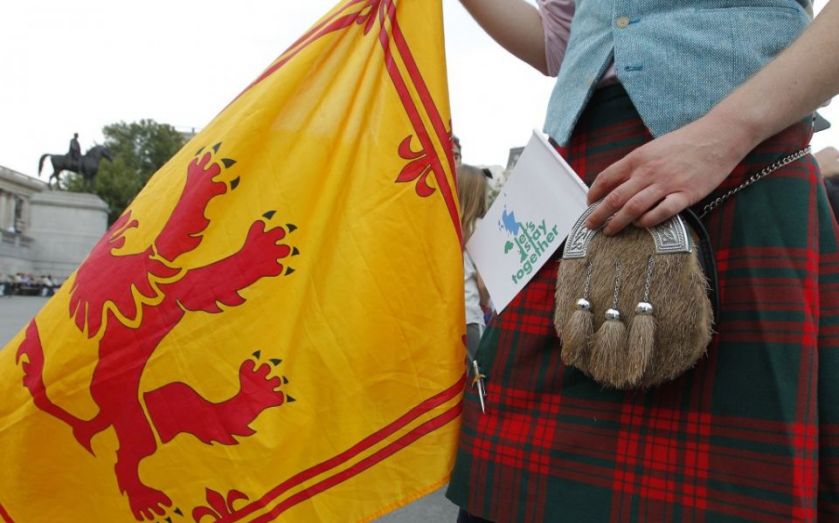| Updated:
The financial A to Z of Scottish independence – CNBC Comment

A new, independent Scotland might flummox a foreign visitor. So it’s lucky this financial A to Z has turned up – even if some say it’s a parody of the Better Together campaign.
A: Alex – Scotland’s official unit of currency, though largely superseded by an informal bartering system, where one barrel of oil buys 10 farmed salmon.
B: Bank – ancient institution now found largely south of the border, due to having balance sheets more than ten times the size of the economy.
C: Capital – not Edinburgh, but the stuff that’s flown abroad – an impressive £17bn in the past month.
D: Double-entry book-keeping – practice of counting the revenues from North Sea oil without considering the clean-up costs, while insisting there are 24bn barrels left versus the 15-16bn bandied about by so-called experts (Sir Ian Wood, Shell, BP).
E: Economy – who cares about that? Especially now Scotland’s reneged on its £143bn share of the UK national debt (see Z).
F: Food prices – higher at Asda, Marks & Spencer, Waitrose etc.
G: Garbage Fees – originally add-on costs associated with exiting mortgages, now used to denote tips to Edinburgh removal men for the relocation of RBS, Lloyds, Standard Life etc.
H: High Net Worth Individual – now abroad. Maybe even JK Rowling, who has warned that healthcare and biomedical research will come under threat in a sawn-off Scotland.
I: Import Duty – going up, what with Scotland’s exit from the EU, at least temporarily.
J: J Curve – a theory stating that a country’s trade deficit will worsen initially after the depreciation of its currency, because higher prices on foreign imports will be greater than the reduced volume of imports.
K: KPW (North Korean won) – currency peg for the Alex, reflecting Kim Jong-Un’s support for an independent Scotland because his people “like the taste of whisky”.
L: Loch Ness Monster – Scotland’s new finance minister, though rarely spotted.
M Ministy of Defence – Gone Awol, like those Trident submarines, whose absence from the River Clyde removes Scotland from Nato.
N: Nine point two (9.2) per cent – Scotland’s influence in the world as measured by its share of UK GDP. At £145bn, on par with Pakistan and Qatar.
O: Oatmeal – lunch (and dinner, once oil revenues, on which 15 per cent of Scotland’s tax take relies, dry up).
P: Private equity – big investors in Aberdeen oil services, but largely immune from looming tax changes, as the buyout boys generally don’t pay any.
Q: Quebec – now twinned with Edinburgh, and template for capital flight, even if the Canadian province narrowly rejected independence.
R: Royal Bank of Scotland – now neither royal or Scottish, but grappling with a pension funding gap, while an independent Scotland shells out £400m to set up a benefits system disentangled from the UK Department of Work and Pensions.
S: Scotcoin – growing alternative to the Alex, as the bitcoin lookalike doesn’t need a central bank at all.
T: Trust – literally vanishing, as the 42 investment trusts based in Scotland look to relocate.
U: Universities – still free, but under pressure as the new government sets about its budget deficit.
V: Vandalism, and Malicious Mischief Insurance – vital for properties that are not occupied, like most of Edinburgh’s financial district.
W: The Windsors – Alex Salmond may call Queen Elizabeth II the “Queen of Scots”, but we all know she’s not amused.
X: X-Ray machines – more see-through than ever, as Scotland cuts health spending by £1bn a year.
Y: Yoof – the 109,533 16 and 17 year-olds given the vote, even though they’d be booted out of the boozer.
Z: ZZZ – Scotland’s credit rating, if it reneges on its UK debts and the SNP’s former deputy leader Jim Sillars delivers his “day of reckoning” to pro-union firms. Otherwise, it may enjoy the same rating, Moody’s reckons, as Botswana.